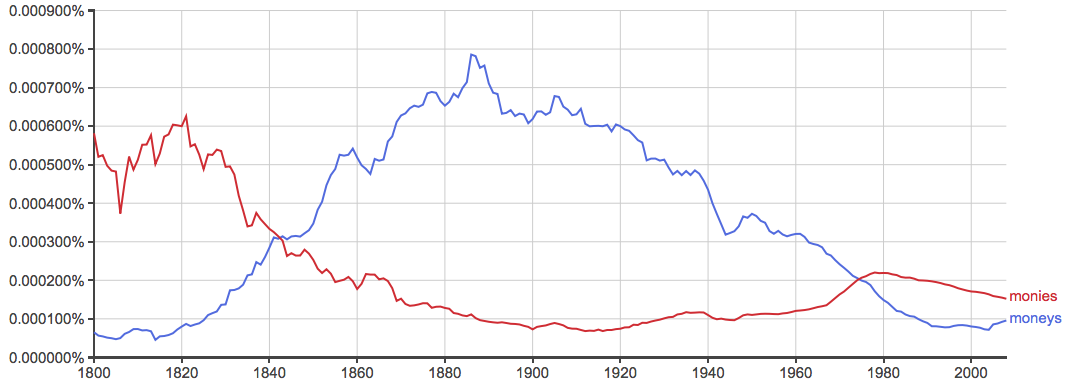If you have ever read a company’s financial filings, you are likely to discover a high volume of opaque jargon. Sometimes, these documents are designed to obscure the financial state of a company, rather than to clarify it.
One word, however, is easy to tackle. Most people use money, but in certain financial contexts, moneys and monies also appear. What do these words mean, and why is anyone pluralizing money anyway? Is it a case of poor editing, or was this strange construction used intentionally?
Continue reading to find out.
What is the Difference Between Monies and Moneys?
In this article, I will compare monies vs. moneys. I will use each of these words in at least one example sentence, so you can see them in context.
Plus, I will show you a mnemonic device you can use to decide between these two words.
When to Use Moneys
 What does moneys mean? Moneys is a plural of money, which is a current medium which can be exchanged for goods and services.
What does moneys mean? Moneys is a plural of money, which is a current medium which can be exchanged for goods and services.
Money is a collective noun, meaning it does not usually need a plural. In some legal or financial contexts, though, moneys is used to describe discrete funds, or money from several difference sources.
Here are a few examples,
- The firms pooled their moneys and bought the ailing retailer for pennies on the dollar.
- Moneys from each tenant will be held by the lessor as a security deposit against damages.
- Moneys payable to the treasurer should be noted as such on the ledger.
When to Use Monies
 What does monies mean? Monies is a variant of the same word. It means all the same things, in all the same contexts. Monies was frequently used around the turn of the 19th century, but it was replaced by moneys for over a century before regaining the lead in popular usage in the 1970s.
What does monies mean? Monies is a variant of the same word. It means all the same things, in all the same contexts. Monies was frequently used around the turn of the 19th century, but it was replaced by moneys for over a century before regaining the lead in popular usage in the 1970s.
This graph charts the usage of these words since 1800,

In his book Garner’s Modern English Usage, Bryan Garner puts monies vs. moneys at a ratio of 1.5:1, corroborating the above graph.
Trick to Remember the Difference
Now, let’s go over a trick to remember moneys vs. monies.
Despite the uptick in usage over the past 40 years, monies is not considered standard. Most edited prose still uses moneys instead of monies.
For formal English, especially in academic or professional settings, you should choose moneys. Since the regular collective noun is money, pluralizing it to moneys should be an easy trick to remember.
If you are writing in less formal contexts and want to stay on top of the current usage trends, monies is probably fine. Still, remember to avoid it any time you need someone to take your writing seriously.
Summary
Is it moneys or monies? Moneys and monies are variants of the same noun, which means discrete sums of currency.
Even though moneys is the standard form, monies is used more frequently.
For day-to-day use, either monies or moneys will work fine, but for now, you should stick to moneys in formal contexts. This rule should be easy to remember, since the regular noun is money.
To summarize, moneys and monies are the same word, but moneys is the preferred form.
Contents
